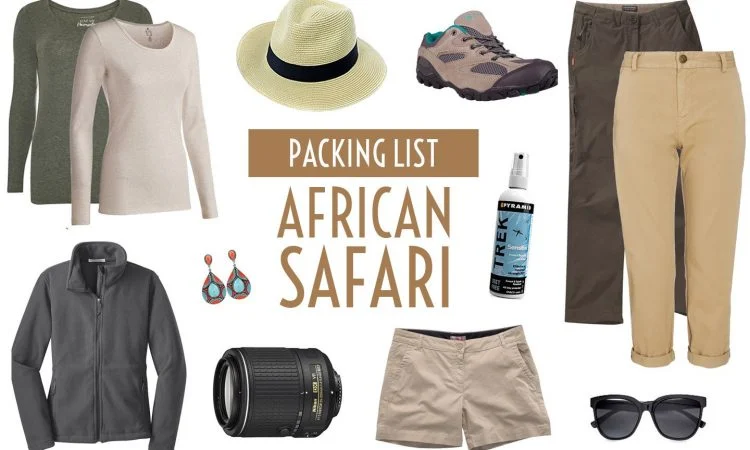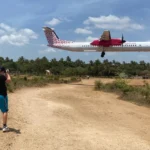Are you planning a trip to East Africa and wondering what to wear on safari in Kenya? We’ve got your back. Kenyan safaris are truly life-changing experiences – you will create memories you will cherish for the rest of your life – and brilliantly, Kenya has some of the continent’s most legendary wildlife-spotting destinations, so you will not be disappointed if you book a Kenya safari.
Are you planning a trip to East Africa and wondering what to wear on safari in Kenya? We’ve got your back. Kenyan safaris are truly life-changing experiences – you will create memories you will cherish for the rest of your life – and brilliantly, Kenya has some of the continent’s most legendary wildlife-spotting destinations, so you will not be disappointed if you book a Kenya safari.
1. Clothing
While on safari, comfortable and casual clothing that is easy to wash and wear is recommended. Muted colours are ideal for viewing game viewing. Game drives are typically conducted in the early morning and late afternoon, when temperatures can be cold, especially in the winter. The temperature frequently rises during the day, so dress in layers. These are the clothing items you should bring;
- Clothes in Khaki – Green, beige or brown (allowing you to blend in during game spotting)
- Long-sleeved shirts that offer protection from the sun and mosquitoes
- T-shirts
- Shorts or a light skirt
- Jeans or safari trousers for evenings and cooler days
- Jackets and sweaters for early morning and late afternoon game drives
- A lightweight waterproof jacket in case of rain
- Swimming costume and beachwear
- Comfortable closed shoes and sandals
- Sufficient amount of socks and underwear
- Broad-rimmed hats and sunglasses
- Warm and cool pyjamas
- Backpack or fanny pack
- Sarong or kikoi
- Waterproof boots
Note: Please note that camouflaged, military~pattern clothes are considered unlawful in Kenya as they are worn by the local forces so best to avoid them. Also when packing, keep in mind that most lodges and camps provide laundry services.
2. Tech & Gear
Given Kenya’s incredible topography and wildlife sightings, some visitors choose Kenya as their sole destination for a photographic safari. Here are some of the items you should not miss;
- Chargers for all electronics
- Binoculars
- Country-specific adaptor plugs
- Camera
- Cellphone
- Memory cards
- Flashlight (small with extra batteries, or headlamp)
- Batteries (for electronic equipment)
- Converter plug set if needed (the electricity supply is 240 Volt, 50 Hz). Sockets are usually 3-pin and are of the square variety.
- Alarm clock
- Books/Magazines/Journal
- Pen/notepad
- Tube of Travel Wash (for small items of laundry)
- Earplugs
3. Travel Documents
Before you begin your safari, don’t forget to bring your travel documents. Check that all of the documents are in order and up to date. Your passport must have at least two blank pages and a validity period of six months from the proposed date of departure from Kenya.
Nobody wants to deal with the stress of managing admin while on what should be a relaxing vacation. As a result, you must have all of the necessary documents before embarking on your adventure. You should check for the following;
- Passports (with visa entries)
- Health cards (vaccination certificate)
- Airline tickets/E-tickets
- Cash & Travellers’ Cheques
- A separate record of Travellers’ Cheque numbers
- Credit Cards (VISA, Mastercard and/or American Express)
- Photocopy of passport/visas/insurance papers
- Emergency contact numbers
- Lodge contact numbers
- Medical certificates
- Maps and guidebooks
- COVID-19 PCR test certificate (fully vaccinated travellers are exempt from PCR testing)
- Travel insurance papers
Note: There is no paper verification of COVID-19 test results and vaccination certificates upon arrival in Kenya. All travellers must upload both documents to the Global Haven platform before boarding an aeroplane
4. Toiletries & Medicine
While some camps and lodges in Kenya offer shops selling essential items, it’s always best to pack your toiletries to ensure you have what you need at all times. These include;
- Malaria prophylaxis
- Prescription drugs (also bring the generic names for these drugs, a good idea to pack 2 separate lots)
- Motion sickness pills
- Insect repellent (containing DEET for mosquitos)
- Sun Screen (SPF 15 or higher)
- Lip Balm
- Shampoo/Conditioner (if you have a preferred brand otherwise shampoo is provided by most hotels and camps)
- Deodorant
- Toothpaste /Toothbrush
- Hair Brush/Comb
- Electric/Hand Razor
- Emery Boards/Tweezers
- Hand Lotion/Hand Sanitiser
- Feminine Hygiene Supplies
- Insect repellent
- Bug bite remedies
- Moisturiser
- Aftersun lotion
- Deodorant
- Rehydration & electrolyte sachets
Note: Wear sunscreens and cover up during the hottest time of day – between 11 am and 3 pm
5. Other Supplies
- Sunglasses/Case
- Glasses (and a spare pair)
- Small Day backpack
- Favourite road snacks
What Should You Not Bring to Kenya?
Kenya, like most African countries, has banned single-use plastics. This is because non-biodegradable materials pose a threat not only to the environment but also to wildlife. Since President Uhuru Kenyatta signed the legislation in 2020, no plastics are permitted in Kenya’s protected areas. As a result, when packing for your safari, make sure your luggage is free of potentially polluting items. The majority of the common single-use plastics banned in Kenya include:
- Grocery bags
- Garbage bags
- Plastic packaging materials
- Plastic bread bag tags
Packing the right clothing, tech and gear, toiletries, and travel documents is essential for a stress-free safari, but you also don’t want to be carrying around a monster suitcase the entire trip. Pack light and remember that less is more, especially if you’re flying or going on a long walking safari between lodges and camps.




